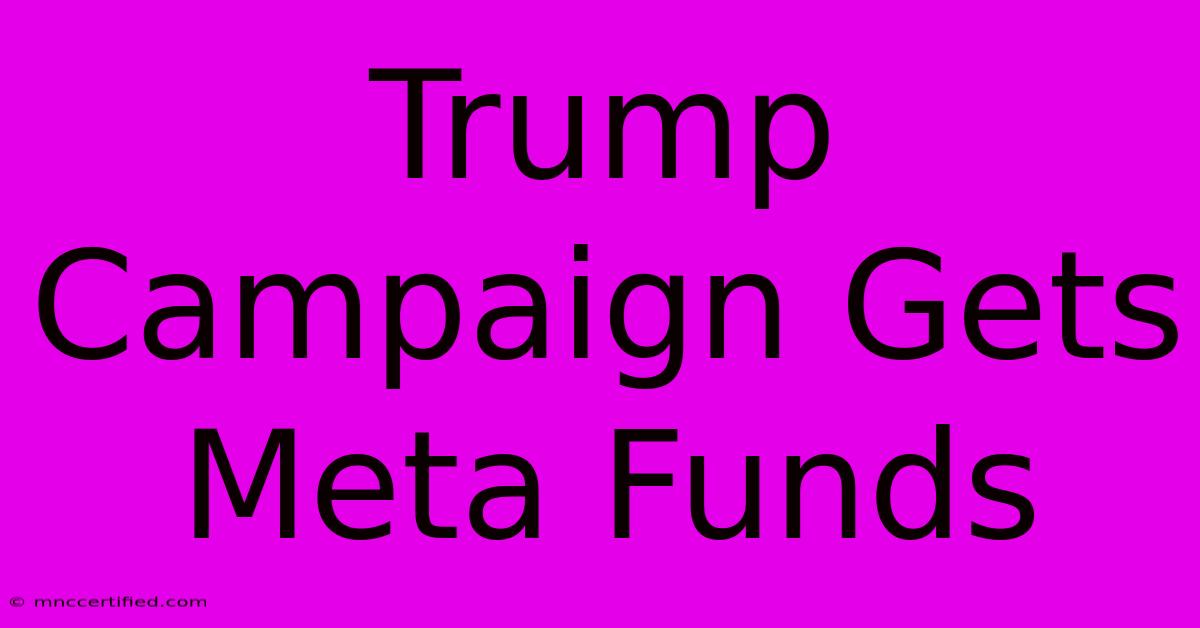Trump Campaign Gets Meta Funds

Table of Contents
Trump Campaign Gets Meta Funds: A Deep Dive into the Implications
The revelation that the Trump campaign received funds from Meta (formerly Facebook) has sparked significant debate and raised crucial questions about the intersection of politics, technology, and advertising. This article delves into the details of this funding, exploring its implications for the upcoming election and the broader landscape of online political advertising.
The Funding Details: What We Know
While the exact figures remain somewhat opaque, reports indicate that the Trump campaign received substantial ad revenue from Meta. This money fueled numerous online campaigns, leveraging Facebook and Instagram’s massive user base to reach potential voters. The specifics of the contracts and the total amount spent remain undisclosed, partly due to Meta’s evolving transparency policies and partly due to the ongoing political climate. However, independent analyses suggest the sums involved were significant enough to warrant serious scrutiny.
Meta's Advertising Policies and the Trump Campaign
Meta's advertising policies aim to prevent the spread of misinformation and promote transparency. However, enforcing these policies in practice, particularly with high-profile political campaigns, presents ongoing challenges. Critics argue that Meta's policies are insufficient, allowing misleading or inflammatory content to proliferate. The Trump campaign, known for its controversial rhetoric and sometimes questionable claims, highlights the difficulties inherent in regulating political advertising online. The question remains: did Meta's policies adequately address the potential for misuse of its platform by the Trump campaign?
Implications for the Upcoming Election
The funding from Meta to the Trump campaign has significant implications for the upcoming election. This financial support directly impacts the campaign's ability to:
- Reach voters: Meta's platforms offer unparalleled reach, allowing the campaign to target specific demographics and tailor its messaging accordingly. This targeted advertising can significantly sway public opinion.
- Shape narratives: The ability to control the narrative through targeted advertising is crucial in a political campaign. The funds from Meta allowed the Trump campaign to potentially shape perceptions of itself and its opponents.
- Mobilize supporters: Targeted ads can be used to drive voter registration, encourage participation in rallies, and promote early voting. This mobilization effort is directly impacted by the financial resources available.
Broader Implications and Future Considerations
This situation raises broader concerns about:
- Political influence: The influence of big tech companies on political campaigns needs greater oversight and transparency. The Meta-Trump funding underscores the need for stricter regulations.
- Algorithmic bias: The algorithms used by social media platforms can inadvertently amplify certain narratives or voices. This potential bias warrants serious investigation and improved algorithmic transparency.
- Misinformation and disinformation: The potential for the spread of misinformation and disinformation through targeted advertising remains a significant threat to democratic processes. More robust measures are needed to counteract this threat.
Calls for Increased Regulation and Transparency
The relationship between Meta and the Trump campaign highlights the urgent need for increased regulation and transparency in online political advertising. This includes:
- Stricter content moderation policies: Social media platforms need to implement and rigorously enforce stricter policies regarding misleading or inflammatory content.
- Enhanced transparency requirements: More detailed disclosure of political advertising spending is necessary, ensuring greater accountability.
- Independent oversight: The need for independent bodies to oversee and regulate online political advertising is growing increasingly pressing.
Conclusion:
The revelation that the Trump campaign received Meta funds underscores the complex and intertwined relationship between technology, politics, and advertising. This situation demands a thorough examination of Meta’s policies, the impact of targeted advertising on elections, and the urgent need for greater regulation and transparency in the digital political landscape. The future of democratic elections may depend on addressing these crucial issues.

Thank you for visiting our website wich cover about Trump Campaign Gets Meta Funds. We hope the information provided has been useful to you. Feel free to contact us if you have any questions or need further assistance. See you next time and dont miss to bookmark.
Featured Posts
-
Okami Sequel A Kamiya Project
Dec 13, 2024
-
Biden Grants Clemency To Many
Dec 13, 2024
-
Greenlaw Warner Share Sweet Pre Game Moment
Dec 13, 2024
-
Rams Announce 2024 Inspire Change Nominee
Dec 13, 2024
-
Vanderpump Rules Star James Kennedy Faces Arrest
Dec 13, 2024